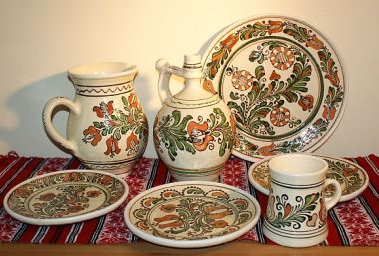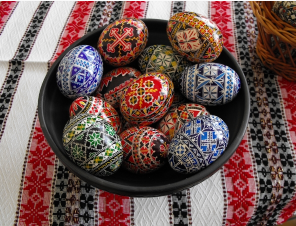 From 10 to 16 March 2014, the Romanian Week – Mediatheque of Beaubreuil. Culture and World food, Project representing The mutual exchanges of knowledge Network Association.
From 10 to 16 March 2014, the Romanian Week – Mediatheque of Beaubreuil. Culture and World food, Project representing The mutual exchanges of knowledge Network Association.
Folk Art – Exhibition: painted eggs, wooden objects and ceramics, photographs, textiles and costumes.
Wednesday, March 12: Time stories for children: bilingual musical fairy tale, with piano accompaniment presenting Romanian traditional pieces. Storytellers: Annick Feydeau, Cristiana Eso. Moment musical directed by Professor Arnaud Cappelli class. Romanian songs, games and proverbs. Tasting of Romanian traditional dessert.
Wednesday 13 March: Time for children needlework, painting eggs workshop polyester animated mosaic Limousin association.
Friday, March 14: Preparing a full menu. Explanation recipes. With the support of generous Réseau d’Echanges réciproques Association of savoirs.
Saturday, March 15: What about Romania? Questions for public batch test winner. Closing Concert of the week, traditional dancing.

The day of Wednesday was reserved for the children and I selected a tale about the cooking.
I proposed to my friend and teacher Arnaud at the Conservatory of music of Limoges to collaborate with me at this project around the culinary art of my birth country, Romania.
I read some of the passages of the story in Romanian, Arnaud accompagnied my passages in Romanian with folk music : ballades, dances, songs.
I also was granted with the help of a presence of Annick who beautifully told the tale in French.
The young audience was especially conquered and even more when we proposed in tasting Rumanian cakes I would like to mention that parents were not insensible in my cooking…

The story is wroted by Petre Ispirescu (1830-1887) was born in a working class section of Bucharest. Never having gone beyond the fourth grade and originally destined for the church, he became a printer, a publisher and a collector of folk tales. And now the story:
ONCE upon a time there was an emperor who had three daughters, whom he loved very much. After his wife died, he took a great interest in his daughters’ education and granted their every wish. He bought his daughters the most beautiful dresses, the most expensive jewels and the most wonderful books. His daughters loved their father more than anything else.
One day the emperor asked his eldest daughter how much she loved him.
“I love you like honey,” replied his eldest daughter. Her father was pleased with her reply and asked his middle daughter. “I love you like sugar,” she replied. The emperor was touched by so much love. He then asked his youngest daughter.
“And my little one, how much do you love me?”
“I love you like the salt in your food, father,” replied his youngest daughter. Her sisters started to laugh at her. The emperor was furious. “What kind of answer is that? Leave my house at once!”
The youngest daughter was not allowed to give any explanation and was exiled. Her sisters laughed at her stupidity and were pleased that she was leaving because they did not really love her dearly. The youngest daughter dressed herself in some simple clothes. She left with sadness in her heart and tears in her eyes.
After a long journey, she reached the palace of another emperor and found work as a servant. She was so hard-working and skilful that before long everyone adored her. She could cook the finest dishes and could make any object shine. The empress heard of this clever servant girl and called her to her. After they had spoken a little, they became inseparable. The girl no longer had to work in the kitchen. Instead she stayed alongside the empress, sewing or painting, and everything she made was incomparably beautiful.
The emperor had to leave for war, taking with him his son. The prince was wounded, and the emperor and the empress were distraught. The empress did not leave his side day or night. And the empress’s servant girl stayed with them. She took such good care of the prince: the very touch of her delicate hands could soothe any pain.
When he had recovered, the prince went to empress and told her that he wanted to marry. The empress was delighted and asked him if he wanted to marry someone in particular. The prince told her that he wanted to marry the servant girl who had tended to him while he was ill because he did not know a more beautiful or more obedient girl. At first the empress was against the marriage because she wanted her son to have a bride of noble blood. But in the end the prince persuaded her. Together it was not difficult for them to convince the emperor, and a date for the wedding was set.
The young bride-to-be asked her future in-laws to invite a certain emperor, but she did not tell them that this emperor was her father. The long-awaited wedding day arrived. The bride-to-be cooked for her father separately and told a servant to bring his food to him personally and to make sure that they were not given to another guest by mistake.
From the moment the emperor arrived, he could not stop looking at the beautiful bride. He felt a pang in his heart as he thought how much she looked like his daughter whom he had not seen for a long time.
When the enticing dishes appeared on the table, everyone tucked in – only the bride’s father could barely swallow his food because it did not taste right and had no flavour. He asked those on his right and those on his left if their food was good, and everyone replied that it was the most delicious meal they had ever tasted. He took a little from his neighbours with a fork and, indeed, it was very good.
Finally he could take it no longer and stood up. He accused his hosts of making a fool of him. His host was just about to call the cooks to punish the person who had played the trick on his guest when the bride admitted that she herself had cooked for her father. She had only used honey and sugar. She had even put sugar in his salt-cellar because the emperor preferred honey and sugar to salt.
Her father recognised his mistake and tenderly embraced the daughter whom he thought he had lost. The other emperor was pleased to have such a clever daughter-in-law, such a fitting bride for his son – and the daughter of an emperor on top of it all.
Moral:
Each person expresses love in his or her own way. Try to understand this before judging them.
 From 10 to 16 March 2014, the Romanian Week – Mediatheque of Beaubreuil. Culture and World food, Project representing The mutual exchanges of knowledge Network Association.
From 10 to 16 March 2014, the Romanian Week – Mediatheque of Beaubreuil. Culture and World food, Project representing The mutual exchanges of knowledge Network Association.
